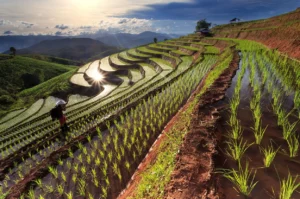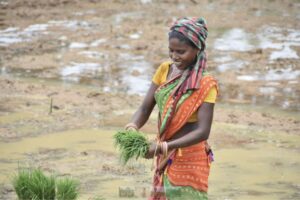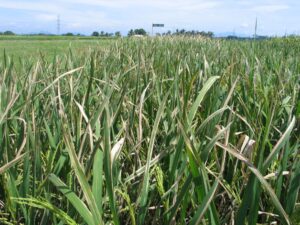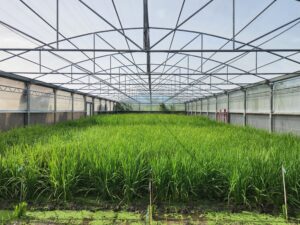| Arvind Kumar, leader of IRRI’s rainfed lowland South Asia Hub plant breeding group, has the rapt attention of some of the Institute’s BOT members on Thursday morning as he explains ongoing research in IRRI’s experimental plots on the ICRISAT campus. |
Hyderabad, India- “In three short years, a systematic breeding program for irrigated direct-seeded rice (DSR) and rainfed conditions is now in place at IRRI’s South Asia rice breeding hub in Hyderabad, India,” says Arvind Kumar, IRRI plant breeder and head of the facility.
IRRI’s Hyderabad team has developed and identified lines that are suitable to drought conditions in South Asia. These lines are being developed in the background of popular mega-varieties in the region. Thus, drought-tolerant versions of Sambha Mashuri, MTU1010, Vandana, Anjali, and Kalinga3 are now ready to be tested and validated in many different locations in South Asian countries.
Kumar and his team have also developed lines that are drought-tolerant versions of Swarna-Sub1, a famous IRRI-bred, flood-tolerant variety that is in great demand by farmers.
“The unpredictable climate with its extreme fluctuations in rainfall and temperature during the wet and dry seasons is giving farmers extreme anxiety,” says Kumar. “Swarna-Sub1 with the drought tolerance trait will surely help those farmers in rainfed areas whose crops often suffer drought during one part of the season and then must endure floods during another part.”
Testing of the Swarna-Sub1 + drought lines began last year in India, Nepal, and Bangladesh. “We also have some promising breeding lines for DSR and aerobic rice,” he adds.
Capacity-building programs for researchers in the region have also been conducted recently through the IRRI hub. These include Marker-assisted introgression of different traits to develop new generation climate-smart rice; Rice breeding: recent developments, emerging challenges, and future needs; and statistical analysis training.
New projects with support from the Indian government and international agencies have been initiated in the hub. These include a Harvest Plus-supported project on zinc biofortification; an ADB-supported project on climate-smart rice; and government-supported projects on breeding new rice varieties and improving productivity of different crops in Karnataka state.
“We are really excited about the work being done in the hub,” says Robert Zeigler, IRRI director general. “The facility is already providing targeted breeding in India with a spillover benefit to its neighbors.”
Learn more about IRRI (www.irri.org) or follow us on the social media and networks (all links down the right column).









